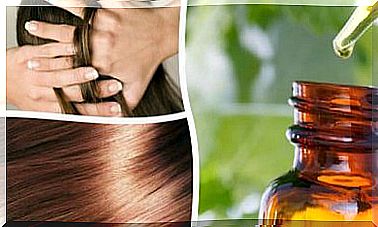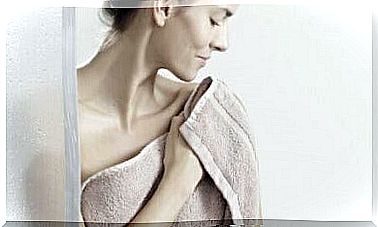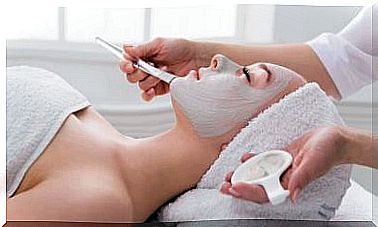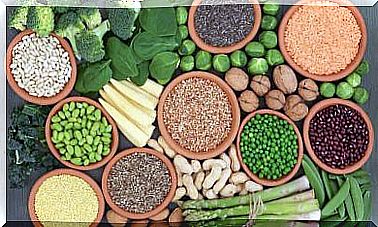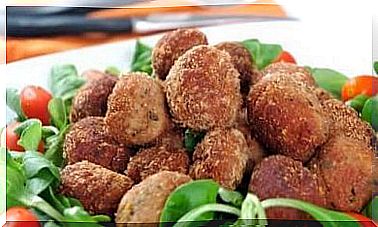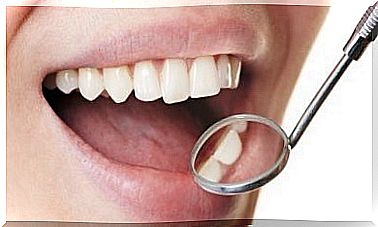Is It Possible To Improve Hidradenitis Suppurativa With Diet?
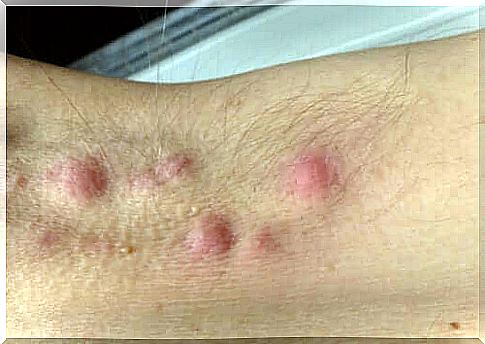
Healthy diets are the best allies for the prevention and treatment of many diseases. Thinking about a diet to help fight hidradenitis suppurativa, or reverse acne, wouldn’t be wrong.
The treatment of this skin condition is supported by a therapeutic guide in which the diet is part of the general non-pharmacological measures, according to the Argentine Society of Dermatology. Although the studies are not supported by strong evidence, giving up consumption of some dairy products, refined foods, sugars and yeasts can improve symptoms.
Additionally, some supplements such as vitamin D, zinc and turmeric would also be beneficial. Let’s look at more details on how diet can help relieve hidradenitis suppurativa.
What is hidradenitis suppurativa?
Hidradenitis suppurativa (HS) is a chronic, recurrent and autoinflammatory skin disease that has a negative impact on quality of life. The hair follicle clogs up and forms lumps that inflame and rupture.
It is called inverted acne because the skin lesion appears under the skin and often in areas where there is friction, such as the armpits and groin.
It has a worldwide prevalence of 0.05% to 4% and women between 20 and 40 years are the most likely to suffer from the problem. N will not know for sure the cause of the obstruction, but among the risk factors are genetics, obesity, skin friction and smoking.
How can diet help in the treatment of hidradenitis suppurativa?
Dr. Lawrence Gibson says that what we eat can have an impact on hidradenitis suppurativa. Nutritious and balanced diets can control overweight and obesity, which are considered risk factors.
There is not enough evidence that a specific diet cures hidradenitis suppurativa, but patients and physicians know the importance of nutritional management in controlling this disease. Here, we review some of the recommendations and advances.
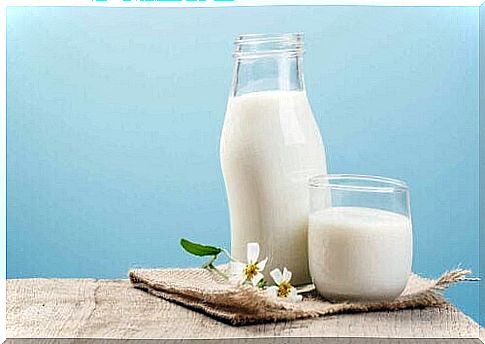
In a publication in the Journal of the American Academic of Dermatology , a group of researchers points out that dairy products, in general, can contribute to acne and HS. By applying a dairy-free diet to 47 patients with the disease, they managed to improve 83% of cases and none got worse.
Dairy products contain casein, whey and hormones known as androgens , which clog the hair follicle. It was concluded that a dairy-free diet can reduce the appearance of new lesions and decrease the symptoms of hidradenitis suppurativa.
It is recommended to exclude milk, fresh cheese, ricotta, curd, cured cheese, milk ice cream, yogurt, cream, whey and butter, among others.
Low glycemic load diet
A group of experts indicated that foods rich in simple carbohydrates, such as sodas, sweets and ice cream, increase blood sugar levels and, consequently, insulin secretion. Thereafter, androgens are released and the emergence of HS increases.
To reduce the glycemic load of the diet, it is suggested to eliminate sugars, desserts, sugary drinks, sweets, syrups, corn syrups, chocolate bars and breakfast cereals. Likewise, the ideal is to increase the consumption of fiber through vegetables, legumes and fruits.
Wheat and Yeast Free Diet
Wheat and yeast have been associated with increased symptoms of hidradenitis suppurativa. Saccharomyces yeast is used in the production of beer, wine and CO2 gas for bread dough. Several researchers have found that this yeast causes a reaction in the immune system, causing intolerance.
A small study of 12 patients who suffered from hidradenitis suppurativa and maintained a no yeast diet for 1 year found that the lesions disappeared and the quality of life improved.
But when patients ate the wheat or beer again, the symptoms returned. The sample size and the lack of a control group do not allow us to generalize the results. It is also unclear whether the yeast problem only occurs in patients with wheat intolerance.
Still, it is recommended to eliminate fermented alcoholic beverages, such as beer and wine, from the diet, as well as bread, cakes, pizza, soy sauces and all foods that contain wheat and yeast.
mediterranean diet
The journal Nutrients reported the results of a study in 41 patients with SH who had a low consumption of typical Mediterranean diet foods. Meanwhile, another group of patients who consumed them did not suffer from the pathology.
The Mediterranean diet includes vegetables, fresh fruits, whole grains, beans, extra virgin olive oil, fish and seafood. At the same time, it reduces consumption of refined and processed foods. It has a low glycemic load and high fiber content.
Low Calorie Diet
In some surveys, it has been observed that many patients with hidradenitis suppurativa are obese and there is a direct relationship between body mass index and disease severity. Dr. Boer reported that low-calorie diets that promote weight loss reduce the onset of the disorder.
In a retrospective study of obese patients undergoing bariatric surgery, it was found that those who lost 15% of their weight decreased the severity of HS.
Low-calorie diets include foods rich in fiber as they produce satiety. In addition, this type of diet excludes products with a high glycemic load, such as sugars and refined products.
vegan diet
Several studies link good gastrointestinal function with healthy skin. This is related to microorganisms that grow in the intestines (the gut microbiota). People with the greatest diversity of microbiota eat more vegetables.
The HS North American Clinical Management Guide published that less microbiota diversity was found in patients with hidradenitis suppurativa and low consumption of vegetables. The control group without HS and with a diet rich in vegetables stood out for having varied microorganisms.
Although there are no studies that support the information, it seems that the exclusion of vegetables belonging to the Solanaceae family (potatoes, eggplant, tomato, paprika) could improve symptoms, as occurs in some autoimmune diseases.
What supplements are recommended to support the hidradenitis suppurativa diet?
Although there is little progress in clinical trials on the use of supplements in the treatment of hidradenitis suppurativa, some experts recommend them as adjuvant therapy.
Zinc
Brocard and Dréno found that zinc gluconate at a dose of 90 milligrams per day acted as a restorer of innate immunity in 22 patients with advanced stages of HS. Other professionals recommend between 30 and 60 milligrams a day to improve the inflammatory process of acne.
D vitamin

Vitamin D also plays an important role in reducing inflammation. Its application in HS has also been discussed. A group of experts noted that 63% of patients with SH and vitamin D deficiency who received supplements of the nutrient had a small improvement from the disease.
In addition, they recommend the use of vitamin D through food or as a supplement, not through sunlight, as it can worsen the clinical picture.
Turmeric
Some studies refer to the antioxidant properties of turmeric. In addition, it also has an anti-inflammatory effect and regulates the immune system. Its active compound, curcumin , modulates inflammation-causing compounds known as cytokines.
Therefore, turmeric could improve the inflammatory process in hidradenitis suppurativa. Although there are no definitive conclusions about dosage and formulation, its positive effect is recognized.
The recommended diet for hidradenitis suppurativa is not just a
If you have hidradenitis suppurativa and are thinking about changing your diet, it is best to see your dermatologist right away. This professional will inform you about the type of diet that best suits your HS stage.
It is also advisable to have a nutritionist to determine the nutritional status and the foods to select in case of food intolerance. The professional should indicate ways of preparation to increase the amount of fiber and zinc.
